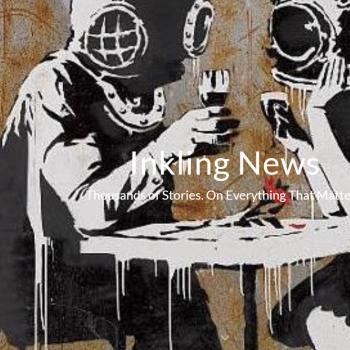In my previous essay, I invoked “those famously fratricidal brothers, Peter and Christopher Hitchens, who published dueling books on behalf of theism and atheism within a few years of each other, brother Peter writing in his book that “’On this my brother and I agree: that independence of mind is immensely precious, and that we should try to tell the truth in clear English even if we are disliked for doing so.’”
Here is the crux of the matter – the Brothers Hitchens, theist and atheist, locked in fatal embrace, in thrall unto death to “independence of mind,” “truth,” and “clear English.” This shared faith in the “immensely precious” value of objective truth, freedom of thought, and grammatical syntax is touchingly Miltonian, of course, but at the same time a revealing tell. Which is that theistic and atheistic cosmologies can’t exist without each other. They require each other, mirror each other, and recognize each other, because both grapple with ultimate questions about what it means to be human and how we, in all our frail and yearning specificity, fit into a universe of immense unfathomability and indifference.
The Cosmology Cage Match
Much has been at stake in these existential debates, to be sure. However, because almost by definition there can be no resolution to them, one must wonder whether in the end the intellectual disputants have cared more about the war than the peace. In other words, is the clash of ideologies and cosmologies the province of a professional class of intellectuals no less attuned and responsive than other types of warriors to the gladiatorial seductions of the cage match, where they can test their prowess against foes and receive glory from friends?
Less charitably, one can imagine the combatants on these ultimate matters to be not unlike the high school debate team prodigies from Ben Lerner’s The Topeka School, aggressively manspreading and mansplaining to crush their opponents, disclosing a will to power that entirely dwarfs any presumed will to persuade. In fact, nearly all the participants in the theism-atheism debate are male, as they are in The Topeka School debate competitions, which should indeed clue us in to the underlying dynamics of these arguments.
Liberal and Analytic Traditions
A recent book by Harvard political theorist Katrina Forrester called In the Shadow of Justice explores how the liberal political philosophy of John Rawls – inscribed systematically in his magisterial work, A Theory of Justice – has reimagined and reinvented itself in response to the global political challenges of the last 50 years. Contemporary liberal political philosophy as Forrester writes about it, emerges largely from within the analytic philosophical tradition that became prevalent in elite British and American in the decades following World War II.
This philosophical backdrop matters because the terms of the debate between theists and atheists following 9/11 occurred among intellectuals educated at Oxford, Cambridge, and Harvard (Dawkins, Dennett, Hitchens, Nagel, Parfit, Scruton, Swinburne Singer, George) who were themselves steeped in this (notably ahistorical) Anglophonic analytic tradition. This tradition assumed a certain commensurability of style, language, and metaphysics that allowed these disputants to fully understand each other, even when they entirely disagreed with each other.
Skeptical Atheism
In this context, what is “new” about the New Atheists? As others have observed, the arguments against theistic religion are themselves definitely not new, having been summarized with similar piquancy and superior concision by Bertrand Russell nearly a century ago. Russell was of course the leading public intellectual in his own time (and arguably one of the first public intellectuals, period). He was a renowned logician and mathematician, a founder of analytic philosophy, a Nobel Prize recipient, and globally influential in both philosophical discourse and public affairs from the 1890s into the 1960s.
Weirdly, however, even as he consorted with the leading post-Newtonian scientific minds of the 20th century, Russell remained throughout his long life an oddly diffident 19th-century rebel: a skeptic who did not want to die for his ideas (because of the possibility that he was wrong); far more like Charles Darwin than Richard Dawkins; constrained by, even as he challenged, the repressive political, religious, and sexual orthodoxies of the Victorian era.
Performative Atheism
Contrast Bertrand Russell, this 19th century genius who lived most of his life in the 20th century, with the New Atheists, 21st-century rationalists who also have lived most of their lives in the 20th century. Deploying essentially the same arguments against religion as Russell, the New Atheists have distinguished themselves and rattled establishment cages by using presumptuous, performative tactics in an emerging digital publishing and media environment enormously more volatile than the traditional publishing and media landscape Russell traversed.
Richard Dawkins, Sam Harris, and Christopher Hitchens were (and are) media-savvy, fully locked and loaded for the era of social networks and viral messaging via memes (an idea, of course, first introduced by Dawkins in his book, The Selfish Gene, published three decades earlier in 1976). Hitchens died in 2011, but as 2019 closes, Sam Harris can claim 1.3 million Twitter followers, while Dawkins has nearly 3 million. Intellectual gunslingers that they are, each has thrived within, and in some measure contributed to, the reactive, trigger-happy social spaces of the Internet.
Emotional Contexts
Other differences between Bertrand Russell and the New Atheists deserve mention. Certainly, the publication of all the New Atheist books in a tight, two-year span between 2004 and 2006 mattered. The timing meant that the authors naturally aligned and together could forcefully direct and control the conversation about religion. However, the impetus for this new foundational critique of religion was also more specifically political and less abstractly philosophical than previous attacks on God and religion. The West was reeling from the impact of the 9/11 terrorism attacks and the subsequent plunge into war in Afghanistan and Iraq. Emotions were incredibly raw, the new digital media space was spicy hot, and the shuddering awareness of civilizational and risk required broad-scope thinking.
The New Atheists have been quite uniformly dismissive of the Abrahamic religions in all their guises. However, the primitive and targeted violence of Islamic fundamentalists has delivered exceptionally low-hanging fruit for the anti-religious claims of the New Atheists. Specifically pungent criticisms of Islam have therefore obscured to some degree their more generalized critique of the Abrahamic religions. Of course, this tilt has also intensified emotional responses to the books, amplifying their influence in the political debate about the U.S.-led wars in Afghanistan and Iraq, as well as leaving these books vulnerable to claims of Islamophobia.
A Rationalist Manifesto
The New Atheists – Richard Dawkins in particular – also brought to this debate a scientist’s sense of bafflement about the prevalence of ignorance and superstition in the lives of most people. Their work constitutes a rationalist manifesto for the 21st century. However, as many have observed, none of the New Atheists sustained anything close to a philosopher’s rigor in the construction of their arguments. This was at least partly because from their perspective the obviousness of the arguments against religion removed the need for any deep dive into the philosophical weeds to dismantle religion’s premises. The words and deeds of religious actors required no philosophical interlocutor to disclose to all their idiotic claims upon the human imagination.
Indeed, because the New Atheists (skilled wordsmiths all) aimed from the start to write for a mass audience, it was essential that they avoid philosophically respectable (of the persnickety, caviling, peer-reviewed sort) standards of argumentation. Their language was polemical and political, direct and unyielding, dismissive and derisive. Nonetheless, it’s worth emphasizing that the New Atheists deployed rhetoric that was in fact largely derived from the vocabulary, categories, and assumptions of Anglophonic analytic philosophy, as well as from even older traditions of moral philosophy dating back to Aquinas.












